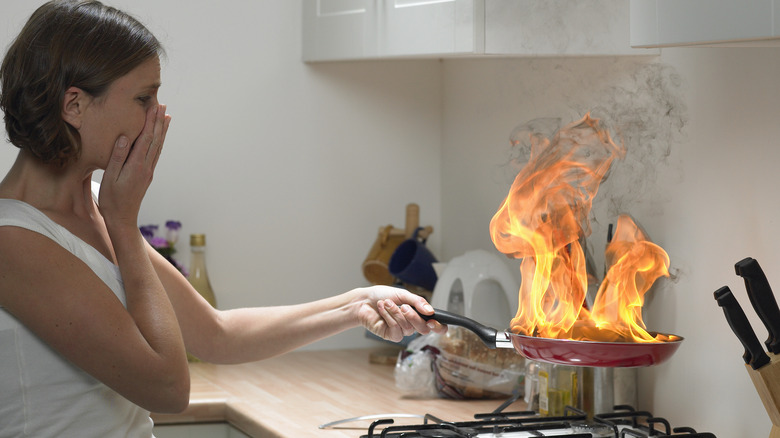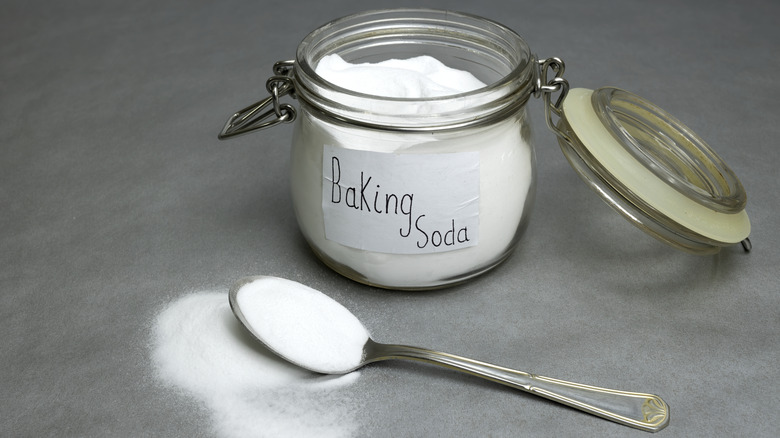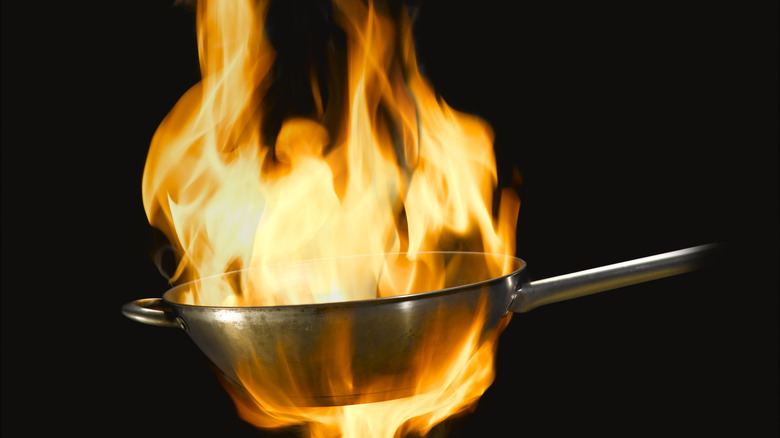Baking Soda Can Seriously Come In Clutch For Extinguishing Grease Fires
Although cooking can be relaxing and therapeutic, it does come with some risks. Any time you cook with heat, you risk a fire. There are many methods for extinguishing fires, but when it comes to grease fires, you have to be extremely careful with how you put them out. Grease is common in the kitchen, whether used in a frying pan, a smaller countertop fryer, or even a deep fryer (like when deep-frying a Thanksgiving turkey).
One option to put out a small grease fire is to smother it with baking soda; it's one of several uses for this incredibly versatile household staple and great cleaning agent. But use your best judgment here, because if you can't immediately put the fire out or it's not small, you should call 9-1-1. Grease fires can start when cooking oil or fat gets too hot. Cooking oil can burst into flames if it gets hot enough to boil and smoke. You probably have baking soda in your pantry or fridge, but there's a catch — only use it if the fire is small because you'll need a lot of it.
You can use baking soda to put out a grease fire
For a fire to grow and burn, it needs a constant oxygen supply. That's why a lit candle in a jar will go out almost immediately if you put a lid on it. When grease in your kitchen catches fire, the oxygen in the air allows it to continue burning. In its simplest form, baking soda is a mix of sodium and carbon dioxide. When baking soda is heated, it releases carbon dioxide. That carbon dioxide will eliminate the oxygen supplied to the fire.
If you notice a grease fire, the first thing you should do is immediately turn off the stove to eliminate the heat source. Then, douse the entire fire with baking soda for it to work properly — which is why this method should only be used on small fires. If possible, cover the fire with a lid to further reduce oxygen flow. If you don't have baking soda, you can also use salt to smother the fire.
Why you should never use water during a grease fire
You've likely heard that water and oil don't mix, so you should never try to put out a grease fire with water. When water makes contact with grease, it causes the grease to splatter as oil molecules repel the hydrogen in water. This then spreads the fire instead of drowning it. Plus, because oil is the less dense of the two liquids, water sinks in oil. This causes all of the oil to rise to the surface, which can make the fire worse. If the grease fire has become too big and baking soda won't work, you can also use a class B fire extinguisher. However, note that fire extinguishers contain chemicals that could contaminate your cooking surfaces, so only use the extinguisher if necessary.
The best way to avoid a grease fire is to constantly monitor the temperature, and never leave a stove or deep fryer unattended. Don't put wet or frozen foods into grease, given that it could cause splattering and burns. If the grease starts to develop a burning smell or you see any smoke, immediately turn off the heat. Cooking with oils is common, but know to always turn off the heat the moment you're done cooking. And remember, fires can spread quickly, so if a fire does start that you can't immediately get under control, call 9-1-1.


